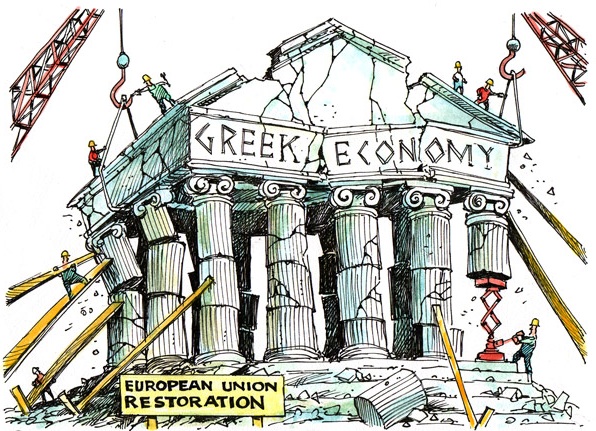Whatever the pros and cons of the current agreement between Syriza and the euro-institutions, it has at least given Syriza a bit of time to consider some longer-term policy options.
A number of commentators and economists from both sides of the political spectrum have recently proposed a ‘third way’ in the shape of a parallel or complementary currency. A complementary currency (or ‘-ies’) could help boost short-term liquidity by providing an alternative ‘means of exchange’ function to the euro.
But what Greece really needs – if it does stay in the euro – is more euros, the currency that its vast public debt mountain is denominated in. At the moment, it’s not clear where such euros would come from. It would not come from government spending, since Syriza is required to run a primary surplus – in other words, save more than it spends. Even if Greece is eventually allowed to participate in the European Central Bank (ECB)’s quantitative easing (QE) program, it is unlikely to get mney into the real economy. And while Syriza is no doubt serious about clamping down on tax avoidance, the scale of the debt and the EU institutions’ refusal to write any of it off, suggests that this is not a long term solution. Further inward investment also looks unlikely given Syriza’s plans to reverse or at least put on hold further privatisation.
There is, however, one type of institution in Greece that can create euros out of nothing. The commercial banks. Unfortunately Greek banks have stopped lending since the crisis began – many of them are basically insolvent and have very little appetite for making loans to Greek firms that look very shaky themselves (see figure 1 below). They are currently being kept alive with emergency funding from the ECB.
But what if Greek banks lent to the Greek government? Economist RIchard Werner proposed ‘enhanced debt-management’. If such loans were long-term contracts and not tradable (unlike sovereign bonds), the interest rates the government would pay on them would be considerably lower than it pays to borrow on international markets since governments receive, according to global Basel regulations, the lowest risk weighting of 0%. This also means the banks would need zero new capital to back these loans. Eventually they would start lending normally to businesses again.
Meanwhile, the Greek government could use these loans to invest in infrastructure and capital intensive projects that Syriza has already identified as much needed. These would have strong multiplier effects that would boost employment and demand in Greece, raising tax revenues (assuming Syriza was successful in its tax collection reforms) and thus enabling it to sustainably reduce the public deficit without further damaging austerity.
Syriza claims to have won some space to design and implement their own reforms rather than have them laid down by the Troika. By using their own commercial banks’ power of credit creation, they might just be able to turn the debt-deflation spiral in to a positive feedback loop, with healthier banks and sensibly priced government debt that’s not subject to speculative attacks from bond vigilantes, increasing demand and a reducing deficit.


